
The Episcopal Diocese of Jerusalem
Website: http://www.j-diocese.org/
The Diocese of Jerusalem covers five countries and is home to almost thirty parishes. Our healthcare and education ministries are active and growing across the region with the provision of hospitals, clinics, rehabilitation centers, and schools. Alongside these ministries the Diocesan Peace and Reconciliation department continues to work at strengthening the interfaith dialogue with our fellow Jews and Muslims. Our Kids4Peace programme in turn strives to educate the next generation in a language of tolerance and acceptance.
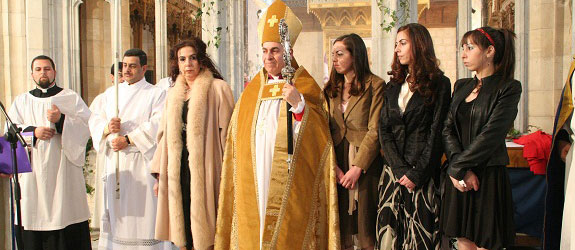 On April 15th, 2007, the new Diocesan Bishop and 14th Anglican Bishop in Jerusalem was enthroned, the Right Rev’d Suheil Dawani. His vision for the future of the Diocese of Jerusalem is to engage in the ministry of peace and reconciliation by strengthening the Christian Presence in the Holy Land. The focus is on working together with overseas partners and collegially in ecumenical inter-faith affairs and encouraging the faithful to join efforts for reconciliation between Israelis and Palestinians. In referring to the importance of Jerusalem, Bishop Suheil emphasizes that he sees it as his duty, and that of all Christians, to make Jerusalem a model for peace between the three Abrahamic faiths. He says, “It is our task to give hope to the hopeless. In our daily lives may we be guided by the star of God’s love.”
On April 15th, 2007, the new Diocesan Bishop and 14th Anglican Bishop in Jerusalem was enthroned, the Right Rev’d Suheil Dawani. His vision for the future of the Diocese of Jerusalem is to engage in the ministry of peace and reconciliation by strengthening the Christian Presence in the Holy Land. The focus is on working together with overseas partners and collegially in ecumenical inter-faith affairs and encouraging the faithful to join efforts for reconciliation between Israelis and Palestinians. In referring to the importance of Jerusalem, Bishop Suheil emphasizes that he sees it as his duty, and that of all Christians, to make Jerusalem a model for peace between the three Abrahamic faiths. He says, “It is our task to give hope to the hopeless. In our daily lives may we be guided by the star of God’s love.”
The Bishop cares for 27 parishes, about 30 priests and 7,000 Anglicans across the Diocese. The Diocese today has over 30 institutions spread across the different countries that it covers. The Diocese employs about 1500 people. It has about 6,400 students in its schools and about 200 beds in its hospitals. The Episcopal Diocese of Jerusalem is engaged in a ministry of Faith in Action in an interfaith region, spreading a message of mutual respect and cooperation through its many institutions, working to bring peace and reconciliation to this conflict torn region.
Parishes in Palestine and Israel
St. George’s Cathedral The Martyr, Jerusalem
The Mother Church of the Episcopal Diocese of Jerusalem
The Arabic Speaking Congregation
MINISTRY: bi-monthly Bible Study, Women’s fellowship monthly, Sunday School and Youth gatherings on Saturday, home visits, administration with Vestry.
VISION: Address needs of aging population and affordable housing shortage for our parishioners and their families.
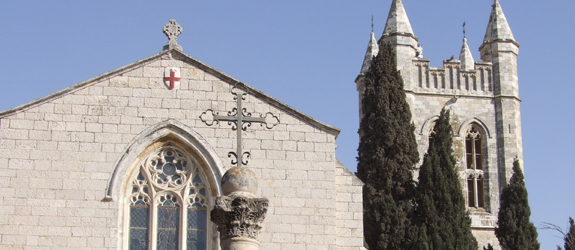 The English Speaking Congregation
The English Speaking Congregation
The English Speaking International Congregation welcomes you. We are a small group of resourceful people, led by our part-time Pastor who is also the Bishop’s Chaplain.
MINISTRY: Sacramental and pastoral ministry to both pilgrims and the English-speaking expatriate community. A place of daily prayer and worship, the Cathedral also plays an important role in support of the ministry of the Bishop for diocesan, ecumenical and interfaith events.
VISION: Continue to expand and develop relationships between the Cathedral, English speaking residents in the area, and pilgrims who come to visit the Living Stones in the Land of the Holy One.
St. Paul’s Church, Jerusalem
St. Paul’s is known to be the first Arab-Anglican church in the region. The church was built in 1873 with the support of the Church Missionary Society of England (CMS) during the episcopacy of the Rt. Revd Samuel Gobat. The church was consecrated for use in public worship on November 29, 1874. St. Paul’s was in regular use by Arabic speaking Anglicans until 1948, when members of the congregation found they could not easily get to the church as it was on the west side of the “green line” dividing Jordanian East and Israeli West parts of Jerusalem.
The congregation began to worship at Christ Church, Jaffa Gate for a few years. In 1953 the congregation of St. Paul’s became, by formal agreement, part of the ministry of the Cathedral of St. George in East Jerusalem. Prior to renovation and reconsecration in March of 2011, St. Paul’s Church had not been in use for regularly scheduled worship since 1948. With the re-opening of the Church, Bishop Dawani continues to encourage the reconciliation and mutual respect of all people. Canon Hosam Naoum, Pastor to the Arabic Congregation at the Cathedral, holds regular worship services in Arabic at 11am on Wednesdays and has provided tours for interested Jewish neighbors. In ecumenical fellowship, the church will also be used by other Christian worshipping groups.
St. Andrew’s Anglican Episcopal Church, Ramallah
MINISTRY: Midweek youth service, Bible study, Women’s group, Youth groups, Scout group, Recreation Club twice weekly, Sunday School, an acolyte program and a new choir. Provide leadership and pastoral support for St. Andrew’s School, the Episcopal Vocational and Technical Training Center, and our sister parish in Bir Zeit with a developing elderly housing project.
VISION: Develop job programs for youth enabling them to stay in the area. Continue to support Christians spiritually and socially.
St. Peter’s Church, Birzeit
MINISTRY: Sunday school and pastoral care. Assist with housing for elderly and jobs for youth.
VISION: Strengthen an aging population. Complete the elderly housing project which will provide safe, affordable housing for our aging parishioners.
Good Shepherd Church, Rafidia
MINISTRY: Provide pastoral care and community support for the minority Christian population. With St Phillip’s church, Nablus, provide support to the Diocese’s St Luke’s Hospital and Kindergarten which have a long history in the region.
VISION: To develop a community centre and a programme of weekly activities for the community.
St. Phillip Church, Nablus
MINISTRY: St. Phillip came to Nablus where he taught and baptized (Acts Chapter 8). Ecumenical youth group, couples’ group, women’s group, and Sunday School with bus transport provided. Provide Christian support and education for all Christians in Nablus.
VISION: With the Good Shepherd Church, expand educational services by adding a school, one grade at a time, so the current Kindergarten class can stay in our Christian school. Build partnerships to raise funds and support to make this possible.
St. Matthew’s Anglican Episcopal Church, Zababdeh
Our ministry in Zebabdeh, in the Northern West Bank.
MINISTRY: To preach the Gospel to all people through our words, deeds, and ministry of healing represented by the Penman Clinic which we operate in the lower floor of our Church building. To provide help and support to needy families. To provide ‘hopeful’ activities, like piano lessons, for children.
VISION: To continue to build and strengthen more partnerships with people from around the world to help combat the poverty, suffering, and loss of hope which is leading our young people to leave in search for a more secure future.
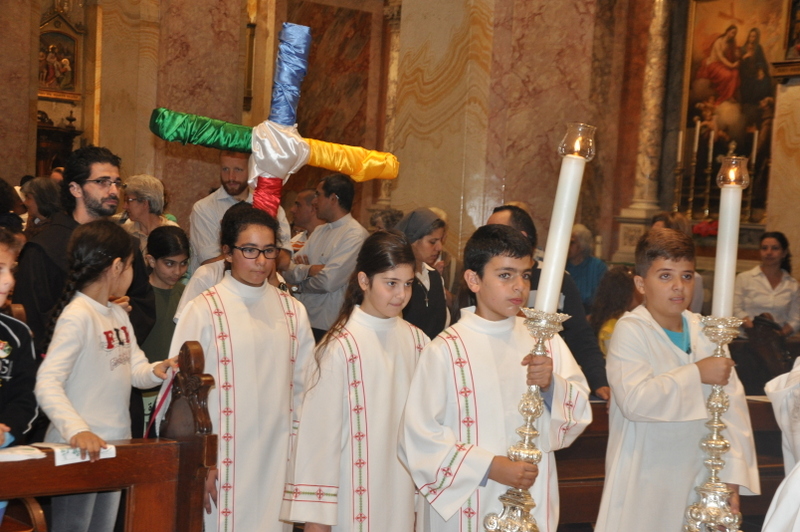 St. Paul’s Church, Shefa’amr, Israel
St. Paul’s Church, Shefa’amr, Israel
Our ministry in Shefa’amr, in Northern Israel.
MINISTRY: To educate all members and visitors with the Word of God. Youth groups, Sunday School and children’s ministry, women’s ministry, young couples group, and Bible Study. To help Christians grow together in the love and hope of Christ.
VISION: To work with our partner Diocese to build a kindergarten school near the church on land purchased with the help of our partners.
Holy Family Church, Reineh
Our ministry in Raineh, in Northern Israel.
MINISTRY: Three circles of ministry include parish ministry of faith empowerment, Christian education and ethics, and faith community building; ecumenical ministry focused on relationships and understanding with other Christian churches; interfaith ministry which focuses on bridging the gaps between people of the three Abrahamic faiths, including hosting the Kids for Peace program with summer camps of children from different faiths.
VISION: To build a specialized High School providing training for local children in Science and Technology; start a women’s catering project to equip women with a means to help support their families; start a Young Journalists Program to foster expression and learning; increase the scholarship program which assists young people with the costs of higher education.
Emmanuel Church, Ramleh
MINISTRY: Ecumenical programs through two weekly groups, Jr. and Sr. High, attended by 25-30 youth, a weekly women’s group with 40 each week, Sunday School for 2 hrs each Sunday morning while many parents are at work, summer camps, and community interfaith ministries.
VISION: To build a parish hall with a rectory apartment on the top floor to save rental expenses, remove asbestos from the current parish hall to make useable office space currently located in the sacristy.
St. John’s & St Luke’s, Haifa
MINISTRY: To do God’s work through different activities of the church, worship, Bible studies, Sunday School, and visitations.
VISION: To bring more young people into the church and encourage them to stay in the Land.
Christ Church, Nazareth
MINISTRY: Sunday School, Women’s meetings for Bible Study and social gathering.
VISION: To unite the members of the parish into a community.
HISTORY: For more information on the history of Christ Church, Nazareth please see this article by Duane Alex Miller – www.stfrancismagazine.info/ja/images/stories/DuaneMiller-oct2012.pdf
Saviour Church, Kufr-Yasif
MINISTRY: Two aims; Bible based preaching and teaching; pastoral ministry with a team of brothers and sisters in the Church doing outreach.
VISION: Increase the ministry and encourage more people to share their gifts.
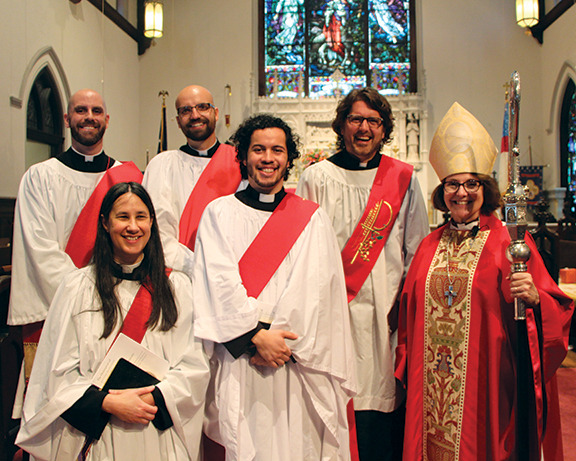 St. Peter’s Church, Jaffa
St. Peter’s Church, Jaffa
HISTORY: In 1902, the mission of St. Peter’s Episcopal Church in Jaffa began in a rented location. At this same time, Miss Constance Newton, a missionary of CMS from England built a school for boys and later a clinic. She also gave land in order to build the church. At the consecration of the church a copper plaque engraved with Miss Newton’s name was installed inside the church building.
In 1905, the first Arabic Synod in the Diocese of Jerusalem voted to reassign The Rev. Boutros Nasser from Birzeit to Jaffa, where he worked closely with Miss Newton and the mission. Fr. Nasser also had oversight of the parishes in Ramla, Lod, Gaza and Aboud. Miss Newton died in 1908 and in her will she donated the land across the street from the school to build the present church.
The church building actually began after World War I in 1918 and was completed on March 22, 1921. The bell tower was completed later in 1942. The diocesan bishop at that time was The Rt. Rev. Rennie McInnes.
VISION: With the support of faithful partners, including descendants of former parishioners, our mission is to restore St. Peter’s Church and restore its ministry.
ST. PETER’S RESTORATION PROJECT: Please read our brochure and Spring 2014 Newsletter. Share with friends, families and contacts. Get involved in St Peter’s Vision Campaign through your prayers, sponsoring small rehabilitation works and when re-opened, your visits.
MINISTRY: Newcomer Ministry: We extend hospitality and welcome to newcomers to our amazing community of Jaffa.
Pastoral Ministry: We aspire to extend pastoral care to pilgrims, English-speaking expatriate community, migrant workers and assylum seekers in the community as well as local Population.
Schools in Palestine and Israel
St George’s School, Jerusalem
Our school in Jerusalem – achieving good aims and improving the quality of education of our young people.
MISSION: Kindergarten, Elementary and Secondary School for boys. Provide excellent education at affordable costs for local families. The school has an excellent reputation and loyal alumni, having educated many respected Arab businessmen and leaders.
VISION: To improve educational resources and training for teachers, updating teaching methods and materials.
St. George’s College, Jerusalem
An Anglican community of education, hospitality, pilgrimage and reconciliation. Through study, site visits, engagement with local Christian community, prayer and reflection, lives are transformed and faith renewed.
MISSION: Enable pilgrim students to study the Bible, visit archaeological sites in the context of an encounter with various people of the Holy Land. To enable students to encounter the three monotheistic faiths of Judaism, Christianity, and Islam, their texts, histories, traditions, and people, and to participate in interfaith dialogue. Focus on education for justice and peace relating in the context of Israel and Palestine. In all courses, St. George’s brings together academic study, spirituality, and travel in a process of holistic learning.
VISION: Full courses, appropriate for the needs of the 21st century, providing a unique blend of study, spirituality and travel so the faith of all who come may grow and mature. Expand facilities for improved dining and teaching areas.
Arab Evangelical Episcopal School, Ramallah
Located in Ramallah, the Arab Evangelical Episcopal School is co-educational from kindergarten through twelfth grade. It offers continuing education and workshops for all staff members in order to maintain and update their knowledge and skills. Ramallah is situated on a crest of the Judean Hills at an elevation of 872 meters above sea level, 10 miles north of Jerusalem. The name Ramallah can be translated from Arabic as the “hill of God” – Ram Allah. The city is situated in a fertile area, with olive trees and vineyards.
MISSION: Like the name of the city itself, the school is a symbol of God’s work, catering to both Muslims and Christians. As a Christian private school, the school has much to offer to the whole community and is largely considered one of the best schools in the area. The school believes that fulfilling its Christian mission comes through serving the Palestinian community in all its diversity, regardless of religion, race, gender, abilities and socioeconomic status of the person.
Episcopal Technological and Vocational Training Center, Ramallah
ETVTC – Hotel School
MISSION: A new program established in 2008, in close association with the Arab Evangelical School, as an educational and vocational option for students in 11th and 12th grades, preparing them to become creative and productive members of society, with a specialization in the hospitality industry.
VISION: Find adequate funding to support this start-up program and continue to build the infrastructure needed to provide a top quality program. Expand the program through the purchase, construction, and/or renovation of a hotel which will serve as the training facility for our students.
ETVTC – Technology Program
MISSION: Improve the knowledge, skills, and attitudes of students from other schools with a quality supplemental technological education program that teaches them how to identify and solve problems, and to design basic systems.
VISION: Obtain funds necessary to update and further develop technical drawing lab and other technological devices in order to reach a higher standard of training and education.
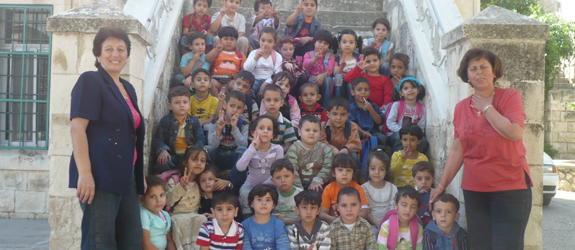 The Christian National Kindergarten, Nablus
The Christian National Kindergarten, Nablus
MISSION: Situated in a predominantly Muslim environment, the school serves the poorest part of Nablus with education at the highest possible level with a Christ-like spirit.
VISION: Over the next two years we would like to expand our services to this area by adding a primary school in the same location.
Evangelical Home for Children
The Home is part of the Evangelical School complex belonging to the Episcopal – Anglican Diocese of JERUSALEM & THE MIDDLE EAST. It was founded in 1954 as a work of faith by three ladies from the U.K. & U.S.A who felt called to open a Home & School. Although circumstances have changed somewhat, and not least the number of children living in the Home the same purposes operate today. It sets out to care for the spiritual, physical and educational needs of the children. The children often come from broken homes; have lost one or both parents or have particular needs which make it hard for them to remain at home with their families. The Home changed considerably in 2003 when part of the building became the site of the Pre-School Unit which takes children from ages 21/2 – 4 years old. Currently it has 38 children. (This unit has already made considerable impact on the community and is seen as a vital piece of work for the Church Organization) The following year in 2004 a Day Care Unit was established which currently has 30 children. At present we have 6 children living at the Home who come from broken families.
Whilst some children leave us when circumstances change at home, which happens more often, we nevertheless try to retain contact with them and help specific needs. (Most remain in our school, anyway). A strong sense of unity prevails amongst our children and is obvious from our Evening Prayers in the chapel to know what their hopes and concerns are whether day by day or for the future. Whilst coming from broken homes and deprived backgrounds they soon learn to relate to each other and have a lot of fun together. All of this helps when attempts are made to improve social skills and help them to relate to one another.
From time to time the Home provides accommodation for the University students, teachers and students who live outside the town as well to be the host for friends and volunteers visiting the School, Home or |Church.
It is our privilege and concern that our children will have a better and good life than that which they have at their own homes, according to our Lord Jesus Christ’s words.
Christ School, Nazareth
MISSION: Provide excellent education in updated modern facilities for all children regardless of religious affiliation in the multi-faith city of Nazareth.
VISION: Increase teacher training, update teaching methods and continue to improve the standard of teaching offered to all children. Continue to develop a pilot programme for students in families returning to their homeland after many years abroad and offer Arabic lessons to these students.
Holy Family Nursery, Raineh
MISSION: Since 1996, the Parish of Holy Family Church has sponsored a Nursery school for children aged 3 months to 3 years which provides an important ministry for both Christian and Muslim families. The ministry makes it possible for women who want to work outside the home by offering a safe and healthy environment for their children. This option empowers women by giving them the support needed to become more active in their communities and helps them contribute to the family income in these tough economic times.
VISION: To further develop and improve the nursery so it will be a model nursery and better reflect our faith and witness. Add an outdoor play area with rood, soft ground, and safe age appropriate games and structures. Purchase audio-visual equipment to help children develop auditory senses. Add games and programmes and encourage visiting specialists in the areas of music, dance and drama. Provide extra training and improved salaries and benefits for loyal staff.
St John’s School, Haifa
St. John’s Episcopal school is the first school founded in the city of Haifa – year 1868c.
Our school belongs to the Anglican Church and therefore acts by the principles of the Holy Bible and follows the values and teachings of the Episcopal Anglican Church.
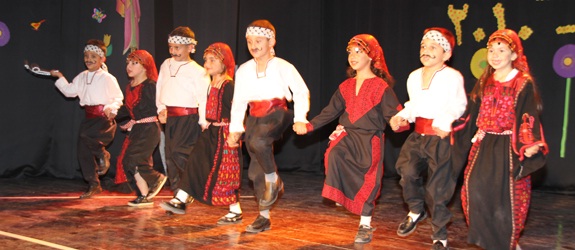 The school is inclusive and takes children of all abilities and backgrounds as it serves all parts of our dear community. Our staff consists of 35charismatic, creative, excellent and carefully picked teachers and office workers. The total number of students in the kindergarten level to classes ranging up to the eighth grade is 494.
The school is inclusive and takes children of all abilities and backgrounds as it serves all parts of our dear community. Our staff consists of 35charismatic, creative, excellent and carefully picked teachers and office workers. The total number of students in the kindergarten level to classes ranging up to the eighth grade is 494.
St. John’s Episcopal School offers a unique experience to young people. Here, our students find themselves in a safe, happy and caring environment where deep mutual respect and love of learning lie at the heart of all we do. Our school’s vision aspires to develop our students’ personalities and works towards becoming an educational luminary in our region. We aim to promote, guide and lead our pupils in order to enable them to continue their studies in the best high-schools and colleges.
With the help of our creative students, our projects are in constant growth. One of these unique projects is the Peace-Education project which deals with raising awareness among students about their rights, serving the community and conflict resolution. It is our school’s agenda to implement values through modeling positive behavior through our style of teaching.
VISION: To expand the school by adding a secondary school giving our children the opportunity to grow up in a quality educational Christian institution.
MISSION: This elementary school focuses on providing the best possible education within a Christian setting with a Chapel for services and assemblies. In addition to all academic subjects, we bring the word of God to all our students. Alongside the Christian Education, We aim to develop independent personalities aware of their social-national identity and able to freely express their opinions. By exposure to different educational and technological skills, students are able to integrate in various social and educational contexts. It is our goal to generate a creative generation able to search, discuss, read, write and keep pace with the different developments around us. It is also in our agenda to teach our students how to cope and behave in a peaceful way in addition to respecting all human rights. Our school’s healthy environment is promoted by the appreciation of a positive school and class atmospheres.
Healthcare
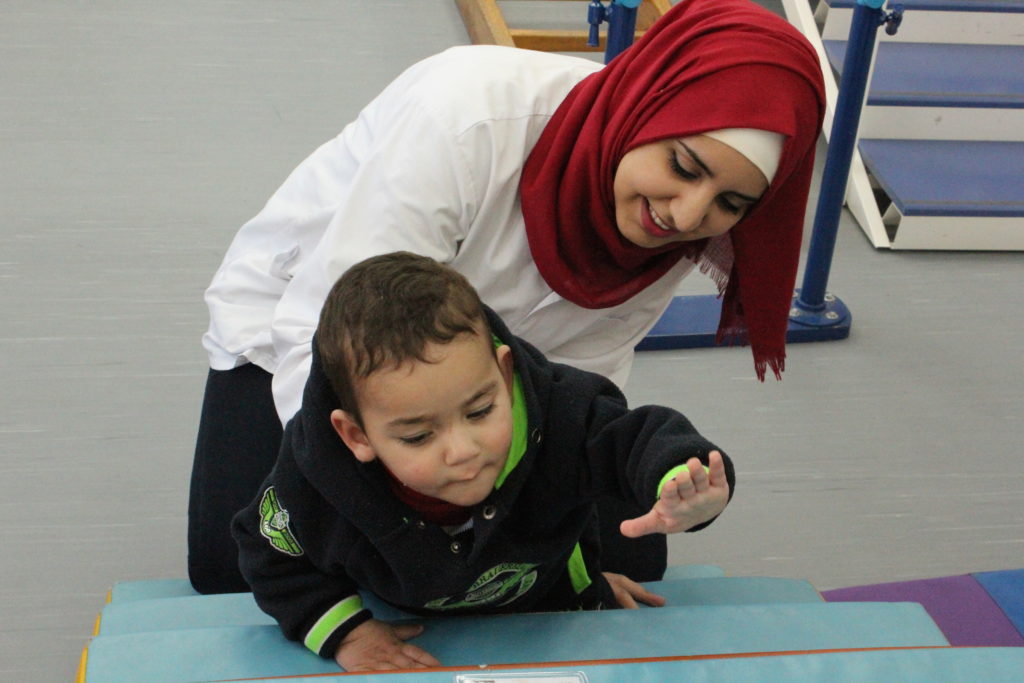 Princess Basma Center for Disabled Children
Princess Basma Center for Disabled Children
The Princess Basma Centre, established in 1965, works on the integration and empowerment of children with disabilities and their families in their communities through: their physical rehabilitation, inclusive education, the development and dissemination of best practices, and influencing policy and legislation.
Princess Basma Centre provides comprehensive rehabilitation for children with disabilities. The Centre treats children with Cerebral Palsy, Down syndrome, head injuries, osteoporosis, neuromuscular diseases, burn cases, learning difficulties/disabilities, children with ASD (Autism Spectrum Disorder), and ADHD (Attention Deficit Hyperactivity Disorder).
Moreover, the Centre runs a Physiotherapy Clinic that provides physiotherapy for adults. The Centre also runs an inclusive school for children with and without disabilities. Finally, the Centre also has a sheltered workshop that provides vocational training for people with disabilities.
St. Luke’s Hospital, Nablus
St. Luke’s Hospital in Nablus is aptly named for the Christian evangelist, gospel writer, and physician. It is a general hospital of 60 beds that provides general and subspecialty medical and surgical services; intensive care; general and subspecialty outpatient clinics; rehabilitation; obstetrics; and neonatal intensive care.
Established more than 100 years ago, St. Luke’s was one of the first hospitals in the Nablus area and continues to assert a fresh and vital presence. A new emergency and trauma center is being equipped to establish its place in the area as a major injury and trauma referral center. A new neurosurgery program has begun to provide another needed service in the area. In addition, recent restructuring and reorganization will enhance programs in urology and orthopedics and ensure that the hospital adapts to the changing needs of its patients.
But the commission of St. Luke’s extends beyond its medical services by providing a prominent Christian presence in an area where few Christian families remain. In Nablus, which has seen some of the most difficult times of the past 40 years, this compassionate presence brings stability and balance to a complicated political environment and further enhances St. Luke’s place in the community.
MISSION: Enhancing the healthcare of our Palestinian community with our newly equipped emergency room, general and sub-specialty medical and surgical services, intensive care, outpatient clinics, rehabilitation, obstetrics, and neonatal intensive care. To serve needy patients and to offer jobs for those people with certain disabilities who cannot find work elsewhere.
VISION: Renovations, essential upgrades and backup for erratic electricity delivery with a hospital USP. Update medical and surgical wards with vital equipment. Upgrade the laundry with new equipment. Obtain necessary medical tools for diagnosis and surgical preparations, like a CT scanner, MRI, etc in order to provide the complete range of hospital services and avoid having to transfer patients to other facilities for needed care.
Penman Clinic, Zababdeh
The Penman Clinic is a community clinic located in Zebabdeh in the north of the West Bank, associated with St Matthew’s Parish. Zebabdeh is distinguished by its history and by its majority Christian population. Near the border of the Biblical regions of Samaria and Galilee, legend holds that Mary and Elizabeth passed through on their visits to each other and it is likely that Jesus knew it during the movements of his ministry. Today, with about 60% of the population Christian, Zebabdeh is one of the most Christian places in all of today’s Holy Land, but the clinic’s services are available to all 60,000 people in the area, regardless of faith.
The Penman Clinic operates every day except Sunday. In the relatively rural area that Zebabdeh occupies, the Penman Clinic is an important primary care facility. A general physician is available at all times in the clinic. He is assisted at designated times by other doctors who provide care in all medical specialties, general pediatrics, and several surgical specialties. Dental services are also available every day. With a clinical laboratory and pharmacy, the Penman Clinic is a uniquely comprehensive healthcare resource for people of the northern West Bank.
MISSION: Providing medical treatment to Zebabdeh and more than 12 surrounding villages for very low fees. Offer the best possible care in an area where there are no other hospitals or clinics and people are often restricted from accessing such facilities in neighboring cities.
VISION: Upgrading facilities and equipment, especially for use in emergency situations.
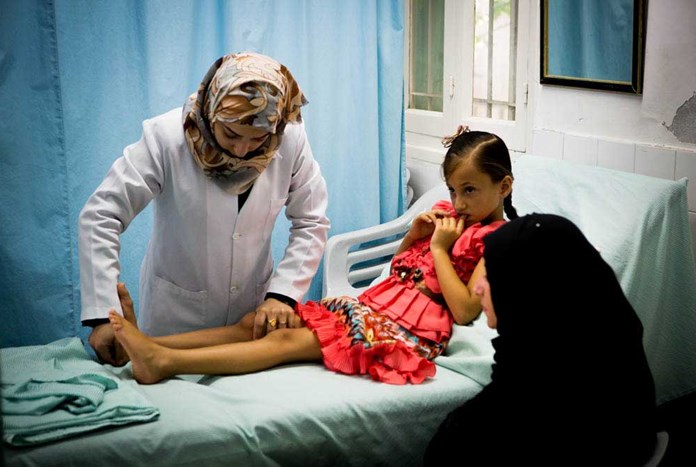 Al Ahli Arab Hospital, Gaza
Al Ahli Arab Hospital, Gaza
Al Ahli Arab Hospital is located in Gaza City and occupies a beautiful campus in the city center. With well-tended grounds, it is a haven of peace in the middle of one of the world’s most troubled places. The political status of Gaza affects all aspects of life here because of restrictions on movement of materials and people in and out. Electricity, medicines, food, fuel, and personnel are all restricted to some extent. However, Al Ahli Arab Hospital continues to provide some of the finest medical care available in the region. For example, Ahli runs completely free of charge a program for early detection of breast cancer among women above 40 years of age. Two programs deserve special mention: the center for elderly women and the mobile clinic program which twice weekly provides free medical care and food to people from surrounding towns and villages. In a land where hardship is commonplace, the conditions in Gaza stand out, but Al Ahli Arab Hospital generates a beacon of peace and hope for the people it serves.
MISSION: The Ahli Arab mission is to glorify God and bear witness to His love as manifested in the life of Jesus Christ. Ahli Arab Hospital is doing this through the provision of high quality patient centered health care services, and maintains the financial viability of its operation. The hospital offers to serve all who seek treatment without prejudice to any religious or ethnic community and irrespective of social class, gender and political affiliation. These services are delivered in a spirit of love and service. Ahli Arab Hospital recognizes the value of its staff and volunteers and promotes equal and compassionate treatment with dignity and respect to all.
VISION: To continue providing the finest medical care possible under the most adverse circumstances to the marginalized and vulnerable poor people whose livelihood are threatened by the effect of human-made disaster, with special attention to the refugee and the poorest of the poor. The hospital is committed to building people’s capacity and competence alongside the development and maintenance of an adequate standard of diagnostic and clinical services
Elderly Home & Community Centre, Birzeit
The Birzeit Elderly People’s home will be able to offer beds for up to 16 elderly people and a secure and safe environment in which to live. It is situated opposite St Peter’s Church and construction of the ground floor of the two storey building is now complete. The ground floor will house a community centre which will provide a space for community events with participants of all ages. The need for such a home is great in the West Bank, as those who can, emigrate for the better prospects of the west leaving elderly family members behind. The Christian population has shrunk heavily over the last few years and those left need help and support in the later years of their lives. The Diocese of Jerusalem, through the construction of the Birzeit home, will seek to offer a lifeline to these people. By so doing it will strive to keep their hope alive through this ‘faith in action.’
The Arab Episcopal Medical Center DIABETIC & CARDIOVASCULAR
Archbishop Bishop Suheil Dawani offers thanks to God and to the many faithful who have made the construction of the new medical clinic possible. This accessible clinic is located in a new space which has been built above the church hall of St. Andrew’s Church in central Ramallah. This outpatient clinic will focus primarily on treating the complicated consequences of diabetes among the Palestinian people and will be open to all, regardless of faith. A diabetic foot programme combined with extensive emphasis on cardio-vascular health will provide services to those in need which are not otherwise readily available.
The construction of the building is now complete and it is hoped that the centre will open this year and begin to serve the local population. This service to those in need is an essential focus of the healthcare ministries of the Diocese of Jerusalem. The clinic’s ministry will be particularly for those who cannot afford treatment elsewhere. A sliding fee scale will be used to allow anyone in need to have access to the high quality care.
Women’s Ministry
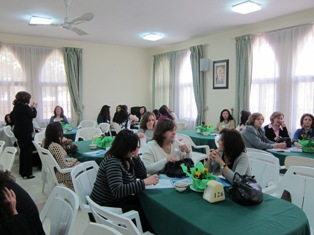 As women comprise half of our parishes and society, the empowerment of women is an essential part of Bishop Dawani’s vision for women’s ministry. Several regional meetings are held each year in different areas of the Diocese to prepare for the bi-annual Women’s Conference, first sponsored by the Diocese in October 2007.
As women comprise half of our parishes and society, the empowerment of women is an essential part of Bishop Dawani’s vision for women’s ministry. Several regional meetings are held each year in different areas of the Diocese to prepare for the bi-annual Women’s Conference, first sponsored by the Diocese in October 2007.
A significant component of these Conferences comes in the planning stages, through local workshops and regional meetings, as women of the Diocese organize all aspects of these events. Each region has a woman or team of women who accept the invitation to be regional Coordinators. These Coordinators, along with Bishop, the Women’s Consultant (a priest of the Diocese), and the Diocesan Women’s Coordinator work to organize the event, inviting speakers, designing the program, finding a suitable location, arranging transport, etc.
Between Conferences, there are frequent regional workshops designed and conducted by other volunteers who serve as Workshop Coordinators. These workshops have a different theme and are open to all the women of the diocese, thereby equipping all women with communication and leadership skills. With these experiences, women are then empowered to apply these new skills in other areas of their lives, their families, careers, and communities.
Kids4Peace
In response to concerns about the future of children in Israel and Palestine, especially in light of the escalation of tensions between the two communities in the Holy Land, our diocese has set in motion a “Kids4Peace” special programme, with a specific focus on “education for peace.” This programme includes meetings between Israeli and Palestinian families from both sides of the cultural and political divide. Children aged 10-12, from Jewish, Christian and Muslim families, are introduced to each other, and engaged in fun and artistic activities. ‘Kids4 Peace’ is non-denominational, non-political, and non-partisan.
All participants – staff, families and children – share a commitment to peace, and a belief that an educational experience of tolerance and respect for cultural and religious diversity should begin with the very young.
Peace & Reconciliation Department
One of the most important ministries of our diocese is the ministry of dialogue and reconciliation between the different faith communities: Christians, Muslims, and Jews. On the day of his enthronement, Bishop Suheil announced the establishment of the Diocesan Department for Peace, Reconciliation and Interfaith Dialogue.
Connections for Peace
Along with the establishment of Kids4Peace, other projects have also been developed across the Diocese.
Our parish in Zebabdeh (St. Matthew’s Episcopal Church) has established the Zebabdeh Youth Group for Peace and Reconciliation to explore a sense of identity for young people, in the context of a shrinking Christian community in the Holy Land, by connecting with students abroad and in their own community. Various trips have taken place to encourage a sense of connection with other communites. Sixteen young people from the village of Zebabdeh went to Ireland to connect and make friends with sixteen young Irish people from Ballinteer Community School in Dublin. As well as learning about the society of Ireland, through music, film, and visits to places of historical and cultural interest, the group, based at the Glencree Centre for Peace and Reconciliation, engaged in the process of creating, exchanging, and exhibiting a scrapbook on their faith and action in their respective communities. Programmes like these are very important for the youth of our diocese and we are very grateful for any initiative and support to develop further programs of this kind.
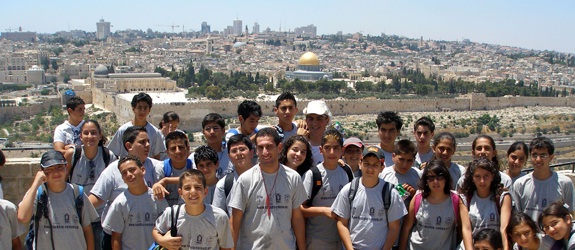 Youth Ministry
Youth Ministry
As the next generation of hope for clergy, lay leadership, institution management and peacemakers, our youth are valued members of our congregations. We actively support them in faith development, mutual respect and cooperation in parish and ecumenical programs. Parishes and ecumenical cooperative programs include children’s Christian Education, Bible studies, youth choirs, social events, and trips.
Regional diocesan youth conferences and summer camps bring the youth together to expand their horizons, explore faith in their lives, develop self-confidence and teach leadership skills. When possible, we invest in connections with youth abroad by receiving pilgrims groups and exchanges with companion parishes.



